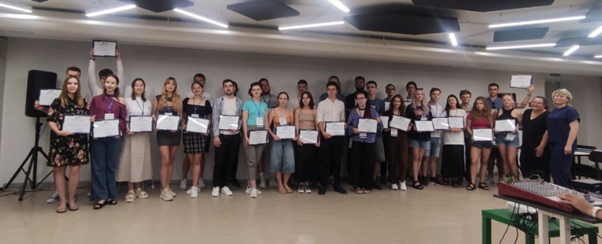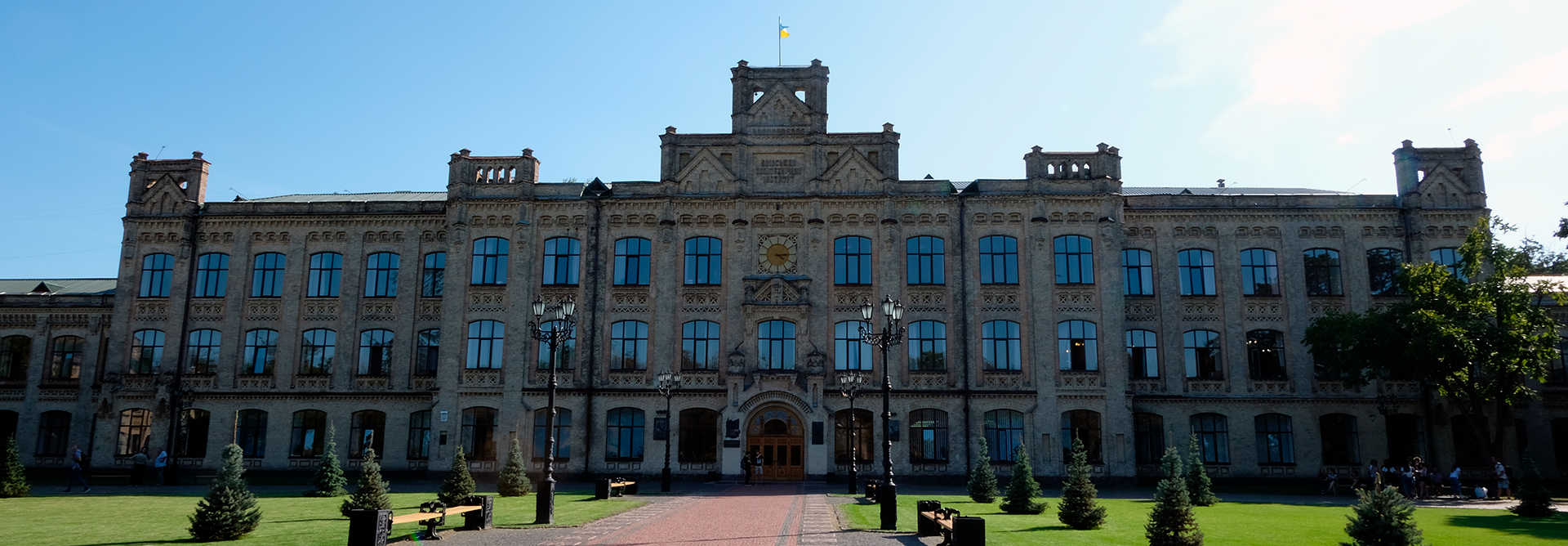
The National Technical University of Ukraine “Igor Sikorsky KPI” continues its series of boot camps within the framework of the international RESCUU project aimed at Ukraine’s recovery.
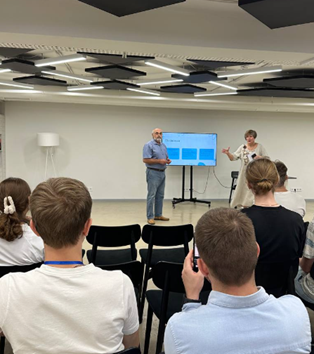 |
The excursion part of the program had to be interrupted due to a massive missile attack on Kyiv. Participants were promptly relocated to the multifunctional shelter CLUST SPACE.
The head of the university’s civil protection department, Ph.D. Yuriy Nesterenko, conducted an express tour of the shelter, emphasizing the importance of proper response to air raid signals and the quality criteria for shelters, alongside a senior lecturer of the Department of Occupational Safety and Civil Defense, Ph.D. Angela Pyatova. |
| In the afternoon, the official opening ceremony of the bootcamp took place. The project coordinator of the Baltic University Programme at Uppsala University, Lyudmyla Babak, welcomed the participants and emphasized the significance of international cooperation in the revival of Ukraine. | 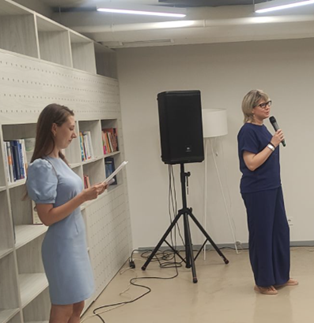 |
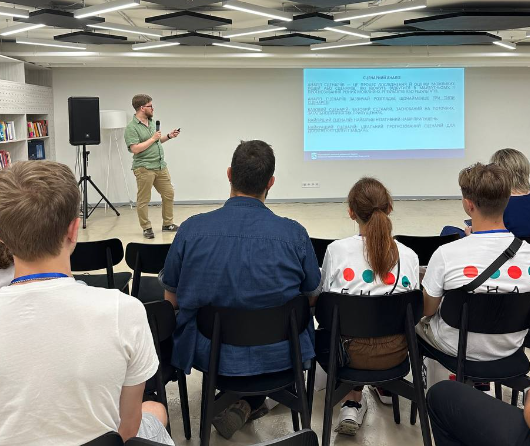
Ph.D. Yuriy Perga gave a presentation on “Prospects for Ukraine’s Integration into the Global Security Order Based on War Termination Scenarios.” He discussed possible scenarios for ending the war and their impact on Ukraine’s future integration into the global community.
After a break, a panel discussion was held where students had the opportunity to act as experts and discuss possible future scenarios for Ukraine. This gave them the chance to express their ideas and predictions regarding the country’s post-war recovery. They were quite optimistic, yet uncertain, which is characteristic of the youth, as they are the ones to shape the future scenario.
The first day of the boot camp demonstrated a high level of participant preparedness for discussing critically important issues of Ukraine’s recovery and their readiness to act in emergencies. Despite the challenges, participants gained valuable information and experience that will contribute to their further activities in rebuilding Ukraine.
The second day started with a panel discussion on “Humanitarian Demining – An Educational and Scientific Challenge for Ukraine.” Representatives from the State Labor Service, the Educational and Scientific Center for Innovative Technologies in Humanitarian Demining, and partners discussed demining Ukraine’s territories.
Angela Piatova, PhD in Sociology, conducted a business game “Security Situational Modeling,” where teams considered crisis situations such as providing first aid and actions in the event of an earthquake.
In the afternoon, Danilo Prykhodko, founder of the 3D laboratory, led a practical session on 3D modeling. He presented the history and applications of 3D printing in various fields. Participants examined printed models and took part in a practical workshop.
The third day of the bootcamp “Science and Innovation for the Revival of Ukraine” began with discussions on important topics such as artificial intelligence, environmental challenges, and renewable energy. Participants gained new knowledge and actively engaged in discussions.
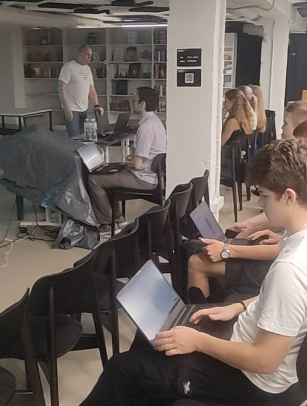 |
The morning session started with a lecture by Doctor of Technical Sciences, Professor Oleksiy Pysarchuk. They spoke about the importance of fundamental methods in artificial intelligence (AI) and machine learning. Professor Pysarchuk emphasized that without a deep understanding of mathematics, it is impossible to grasp AI and data science. The discussion covered topics such as what intelligence is, whether the ability to distinguish objects is a sign of intelligence, and whether ants possess intelligence. The conclusion was that AI has two components: the imitation and modeling of human cognitive activity and the ability to solve non-deterministic tasks. Using a practical example of currency exchange rates from a savings bank, it was demonstrated how to teach a system to see data, perceive it, and create trends. The main emphasis was on the correct setting of data. |
| Candidate of Biological Sciences, Associate Professor, and Head of the Department of Ecology at Kyiv-Mohyla Academy Viktor Karamushka discussed the environmental challenges faced by Ukraine due to the war. In particular, the tragedy at the Kakhovka Hydroelectric Power Station and its consequences were examined. Participants were divided into teams to discuss options for restoring or abandoning the restoration of the Kakhovka Hydroelectric Power Station, considering aspects of electricity, industry, and field irrigation. The problem of destroyed oil depots and their impact on the environment was also discussed. Oil products that have entered groundwater cause serious environmental consequences. | 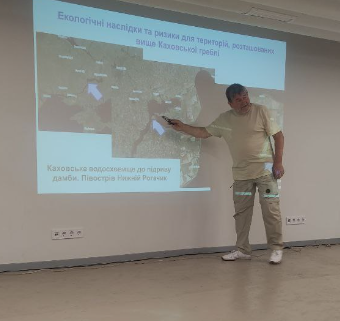 |
Doctor of Sciences and Head of the Department of Renewable Energy Sources Vasyl Budko spoke about the practical use of renewable energy. He emphasized the importance of green tariffs and the use of solar energy, as well as electric and thermal energy in modern conditions.
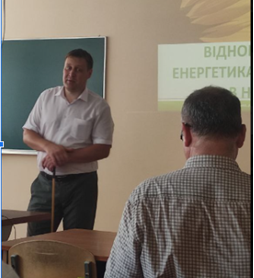 |
A fourth-year student of the Mechanical Engineering Institute, Oleksiy Morgun, presented his project of a portable wind generator made from recycled composite materials, which won an international competition. His innovative approach to creating environmental solutions impressed the participants and the competition jury. |
| After an intensive day, participants enjoyed acoustic music at the art space “VEZHA.”
The third day of the boot camp was rich with information and active discussions. Participants gained new knowledge and exchanged ideas on the future development of Ukraine in the fields of artificial intelligence, ecology, and renewable energy. |
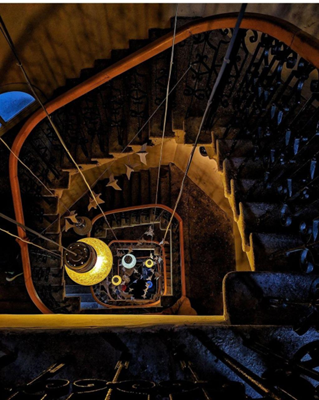 |
The final day of the bootcamp “Science and Innovation for the Revival of Ukraine” began with a lecture by Professor Rodney Stevens from the University of Gothenburg (Sweden). His presentation on “Project Evaluation Using AI” highlighted key aspects of applying artificial intelligence in research activities.
Stevens provided an in-depth explanation of the course “Project Scoping with AI Assistance” and shared his experience in using conceptual modeling to analyze environmental and social issues. He emphasized the importance of a multi-purpose approach that enables effective solutions to complex problems through interdisciplinary and multisectoral efforts. One of the key themes was the discussion of risks and benefits of using AI in project activities.
The next lecture was delivered by Anna Holmska, a leading expert from the Research Institute in Ljubljana (Slovenia), on the topic “Application of AI in Research Activities.” Holmska discussed using AI to optimize research processes and enhance the efficiency of scientific investigations. She stressed the importance of ethical constraints and the need to consider diverse perspectives to balance the risks and benefits of AI.
One of the most significant parts of the day was the panel discussion “The Future of Ukraine Through My Eyes,” where participants had the opportunity to share their ideas and visions for the country’s future.
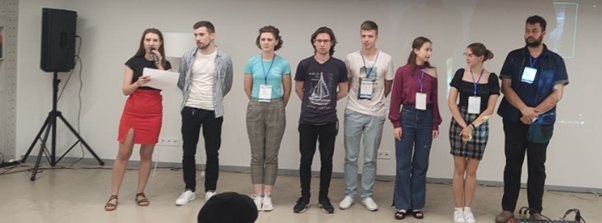 The discussion was rich with diverse opinions and proposals for Ukraine’s development. Below are the key ideas voiced by the participants:
The discussion was rich with diverse opinions and proposals for Ukraine’s development. Below are the key ideas voiced by the participants:
– Anna Skusynets (Sumy State Pedagogical University named after A.S. Makarenko), a volunteer aspiring to lead a charity organization, emphasized the critical mission of volunteers during and after the war. According to her, volunteers can become an effective force against corruption.
– Yelyzaveta Marchenko (Sumy State University) stated that education is a key sector for investment. She highlighted the importance of ensuring high-quality and safe education at all levels and the necessity of having civil defense shelters in every educational institution.
– Oleksiy Morgun (Igor Sikorsky Kyiv Polytechnic Institute) spoke about the need to popularize science and technical knowledge. He noted that industry should aim to produce high-quality products supporting the military-industrial complex.
– Polina Dovzhenko (V.N. Karazin Kharkiv National University) focused on the environmental aspect. She emphasized the importance of researching ecological zones such as the Kakhovka Reservoir and Izyum Forest and the necessity of creating plastic recycling plants, which could be used, for example, to 3D print parts for modular houses.
– Vladyslav Bondar (Sumy State Pedagogical University named after A.S. Makarenko), a representative of the public organization “Dialogue,” highlighted the importance of adapting people who have lost limbs and providing psychological assistance. He underscored the importance of psychological support and awareness in communicating with military personnel.
– Tymofiy Kotlyar (Bila Tserkva National Agrarian University), who won the audience choice award, identified support and modernization of the agricultural sector as a priority. He emphasized the implementation of technologies to ensure sustainable productivity and the decentralization of systems in the country.
– Yakiv Matskul (Igor Sikorsky Kyiv Polytechnic Institute) emphasized the importance of developing a strategy for building various types of shelters that meet modern safety needs.
The closing moment of the day was the certificate awarding ceremony, which ended with a group photo of all participants.
